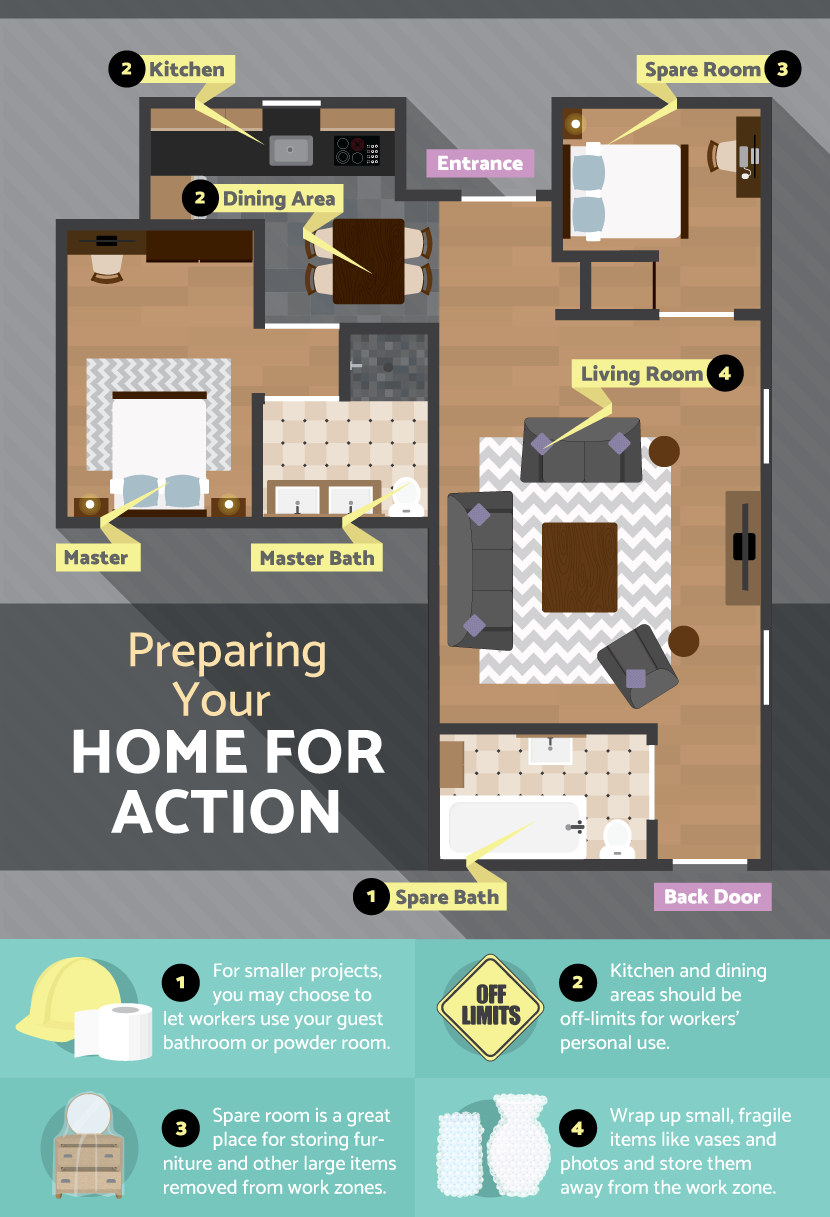Preparing Your Home and Yourself for Major Renovations
You’re smart to have decided to contract out your major home project. Remodeling a kitchen or bathroom, building an addition, or totally remodeling your home are all jobs that extend far beyond the skill level of most homeowners.
If you have ever survived an arduous do-it-yourself project, finding a contractor may give you a sense of relief, as you envision yourself telling the contractor what to do and then having it magically done for you.
But while your physical labor will be minimal, a different kind of work is involved: preparing yourself, preparing your home, and dealing with your contractor. Let this guide ease your home’s transition into a gorgeous sanctuary that you will love for many years to come.
Prepare Yourself and Your People

There is a season for everything, and some seasons are better than others for major remodeling projects.https://www.homeadvisor.com/article.show.When-is-the-Best-Time-for-Big-Projects.14105.html For most exterior house projects, such as painting or deck-building,
temperate seasons such as late spring, summer, and early fall are best.
For roofing projects, the middle of the summer provides the longest stretch of dry weather. Interior projects can be done at any time of year, as they are independent of the weather.
But these are only ideals. Contractors and tradesmen often extend those seasons as far as possible, because, like most people, they cannot afford to shut down their businesses due to inclement weather. As a result, they have workarounds that allow them to roof far into the fall or paint in the winter.
Should You Stay or Should You Go?
The timeline for building that addition is eight weeks. The timeline for your once-in-a-lifetime trip to Europe: eight weeks. Like peanut butter and chocolate, they just go together, right?
Well, no. Unless you have a fully briefed friend or relative who is willing to supervise your renovation while you ply the canals of Venice, this is not the time to take an extended vacation.
Even in our virtual, connected world, nothing compares to seeing and touching your ongoing renovations in real life or talking to your contractor in person.
Arranging Your Schedule
Do not expect to rearrange your work schedule or curtail local leisure activities due to your remodeling project. Contractors work around your local schedule.
Remember, they are receiving a hefty commission. So, meeting you at the job site after work or during your lunch break is what they do.http://www.consumer.ftc.gov/articles/0242-hiring-contractor
Talking to Children about It
Depending on your child, he or she will be either excited or upset at the prospect of major home improvements.
Elementary school kids are rarely blasé about seeing construction equipment tearing into their backyard or workmen ripping down walls. Some children find the process upsetting because they feel their world is changing around them.
Others are so caught up in the thrill of the activity that little else matters to them.
In any case, talk to your children before the project starts, describing the process in general, and stressing that this is all about a positive eventual outcome – a new pool, an addition, a larger living room, new floors – and not about destruction.
Protecting Your Relationship from the Project
If you enter a major home remodeling job knowing that it will put significant strain on your relationship, you are already off to a good start.http://www.huffingtonpost.com/2013/07/31/home-renovations-divorce_n_3679074.html
A remodeling project is a perfect storm where many factors clash: huge cash outlay, mess, diminished privacy. Protect your relationship by keeping the lines of communication open but giving each other ample breathing room when needed.
Neighbor and Community Relations
If you live in a single-family detached home, you probably are not legally obligated to seek approval from your neighbors for your project. Remodeling projects that touch the property line, like fences, are an exception.
If you live in a condominium, you may need to seek approval from the board for remodeling projects within your walls. It is almost certain that you will need approval for projects that involve common (shared) walls or your home’s own interior walls.
As a goodwill gesture, though, you should talk to your adjacent neighbors, informing them of your upcoming plans.
Prepare Your Home
How Much Should You Do Yourself?
Some homeowners believe that they should not have to lift a finger prior to their upcoming project. Others jump in wholeheartedly by “helping out” the workmen prior to or during the project. What should you do?
In general, it is unwise to do absolutely nothing prior to your remodel. Some prep work, such as clearing out rooms, is involved, and it is only to your benefit to do this yourself.
Unless you have made prior arrangements with your contractor, you should not do any work during the course of the remodeling project.
Contractors hate it when clients change things around at night or on weekends when the workmen are not around, as this impedes the workflow.

3 Things You Absolutely Must Do
- 1. Move Fragile and Precious Items: China, photos, artwork, electronics, and all other items that you do not want to get broken or dusty should be moved by you out of the work area and into safe zones (see below).
- 2. Clear Rooms of Large Items: What about the big stuff, like sofas, cabinets, large rugs? If you are capable, the best-case scenario is for you to remove these items from the work zone and seal them tightly in plastic sheeting. If you are not capable, speak to the contractor about this. For a nominal fee, the contractor may agree to have some of the workers perform this task for you.
- 3. Keep Your Items Safe From Theft or Misplacement: Whether located in the work area or not, any items of monetary value – jewelry, cash, precious metals, even some prescription drugs – should be removed from the home and placed in a safe deposit box. If you have a home safe, store them there. You don’t want to play the blame game with your contractor or their workers, especially if it turns out your child misplaced something.
Establishing Zones and Limits
Even though workmen are invading certain areas of your home, this does not mean that they can go anywhere and do anything. Contractors will usually order up portable toilets for large-scale projects, like building an addition.
But in most other remodeling projects, there will be no toilet. It is your decision about whether to allow workmen to use yours.
If you have a guest bathroom or powder room, it will be to your advantage to “sacrifice it” to the workmen during the course of the project. Tip: remove all towels and place a roll or two of paper towels on the back of the toilet for workers to use.
Unless you are feeling especially generous, kitchens and dining rooms are off limits for workers to use. You are not expected to provide dining facilities.
Working with Your Contractor
Communicating with the Contractor
Before you start a project, you and your contractor will establish lines of communication: phone numbers for calling or texting as well as email addresses.
Contractors are all about communication; they spend their days talking to clients, sub-contractors, and designers.
If the contractor is not responding to you on a timely basis, that person is not doing his or her job well.
But what is “timely”? Since you are probably not the contractor’s only client, it is unreasonable to expect the contractor to return your call within minutes. Calls or texts should be returned within the day.
Emails involving documentation, such as drawings or change orders, may take a couple of days for the contractor to process.
Who Pulls the Permits?
Contractors will apply for the building permit and see it through the entire process. This is one of the services that contractors perform that make your life easier.
Contractors often have an easy rapport with staff members at permitting offices and they understand the complexities of the permit process. Rarely is it better for the homeowner to deal with permits.
All permit fees will be listed separately on the contract, but the charge for dealing with permitting will be included in the contractor’s commission.
Change Orders
Change orders are addendums to the original contract that account for any changes made to it. Home improvement and building are fluid processes.
Writing a contract before a job has begun is like trying to nail down Jell-O. While you try your best, you are essentially trying to predict an uncertain future.
This means that you should not be alarmed by change orders. These are mutual agreements between you and the contractor; nobody is telling you to do anything.
You have a choice. In fact, most change orders are initiated by clients as they creatively reshape the project.
The Price Is Going Up: What to Do?
Most changes involve more work and thus more money. The contractor may discover unforeseen complications that require extra work. Or you may ask for changes that involve additional work.http://www.remodeling.hw.net/business/operations/discouraging-change-orders
Limiting changes is the key to controlling remodeling and building costs. The main way to do so is to make sure that the entire scope of the project is discussed in your pre-construction conference.
Another way to limit costs is to purchase some building items yourself, rather than the contractor ordering them. Often it makes design sense, as well as financial sense, for you to buy light fixtures, paint, window coverings, and other small items.

How to Deal with Delays
Nobody welcomes delays in the project: you want your house back and the contractor wants to move on to other jobs. Your project’s timeline is spelled out in the contract.
Change orders will undoubtedly slow down the timeline. So, limiting your changes is an important step toward meeting project deadlines.
In fact, if no changes have been initiated, blame for the delays most often rests squarely on the contractor’s shoulders. In extreme cases, you can sue the contractor for breach of agreement.
In most cases though, it won't come to this. By planning out your remodel in advance and knowing what to expect, you will be prepared for the minor bumps in the road along the way.
Contracting out a home remodeling or construction project helps you by leveraging the skills and manpower of experienced professionals.
Embed the article on your site

